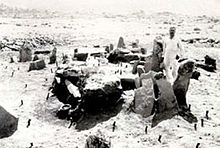Encarnación Cabré
Encarnación Cabré | |
|---|---|
 1931 passport photograph | |
| Born | Encarnación Cabré Herreros March 21, 1911 Madrid, Spain |
| Died | March 18, 2005 (aged 93) Madrid, Spain |
| Alma mater | Complutense University of Madrid |
Encarnación Cabré Herreros (21 March 1911 – 18 March 2005) was a Spanish archaeologist.
Cabré developed an interest in archaeology at a young age. She accompanied her father
Cabré is considered to be the first woman in Spain to become a professional archaeologist.[1][2][3] In 2019, the Spanish parliament recognised her for contributions to women's professional advancement.
Life and career
Early life

Encarnación Cabré Herreros was born on 21 March 1911 in
In 1917, her family moved to Madrid, so that her father could conduct his research on
Academic career

Cabré began to work as her father's main collaborator with much of his fieldwork in 1927, when she was seventeen years old.[5] She accompanied him on excavations in peninsular Spain through her university education and until the Spanish Civil War, and later acted as a co-author on the report of their results. She attended the Complutense University of Madrid from 1928 to 1932, where she obtained a degree in history.[1][6][5] From 1929 to 1956, she published a book and over twenty articles.[7][page needed] In September 1929, she attended the IV International Congress of Classical Archaeology in Barcelona, where she presented the only study conducted by a Spanish woman. She also attended the XV International Congress of Prehistoric Archaeology and Anthropology in Portugal in 1930. The same year, her portrait was included in publications by the Portuguese and French press which discussed the modernity of Spanish women.[1][8]
Cabré taught as a professor at the University of Madrid and the
From 1937 to 1939, Cabré completed her doctoral studies while she worked under the archaeologist
Later life

Cabré began to publish again in 1975, mainly in collaboration with her son Juan Morán Cabré, and continued doing so until the end of her life. She died on 18 March 2005 in Madrid. Upon her death, she had her father's and her own archives donated to the Autonomous University of Madrid.[1][12]
Legacy
According to archaeologist María Luisa Oliveros Rives, in the first three decades of the 20th century, women were incompletely incorporated into the profession of archaeology.[6] Women scarcely took part in excavations, where they were often viewed as "a disruptive and undesirable element".[6] Margarita Díaz-Andreu, an archaeologist at the University of Barcelona, has defined Cabré as an exception to this predominant view, since Cabré was exposed to the field of archaeology through her father and collaborated with him on much of his fieldwork.[6]
In 2018, the political group
Notes
- ^ a b c d e f g h i Real Academia de la Historia.
- ^ a b c d e Riaño 2019.
- ^ a b La Vanguardia 2018.
- ^ a b Baquedano Beltrán 1993.
- ^ a b Alonso & Fullola i Pericot 2006, pp. 365–366.
- ^ a b c d e Díaz-Andreu 1998, p. 132.
- ^ Díaz-Andreu 1998, pp. 132–134.
- ^ International Union of Prehistoric and Protohistoric Sciences 2009, p. 280.
- ^ Díaz-Andreu 1998, p. 133.
- ^ a b Díaz-Andreu, Mora Rodríguez & Cortadella Morral 2009, p. 162.
- ^ Díaz-Andreu 1998, p. 130.
- ^ Díaz-Andreu 1998, p. 134.
References
- Alonso, Francisco Gracia; Fullola i Pericot, Josep Maria (2006). El sueño de una generación: el crucero universitario por el Mediterráneo de 1933 (PDF) (in Spanish). Edicions Universitat Barcelona. ISBN 978-84-8338-483-1.
- Baquedano Beltrán, Isabel (1993). "Encarnación Cabré Herreros, la primera mujer en la Arqueología española". Revista de Arqueología (in Spanish). 146: 54–59.
- "Encarnación Cabré Herreros". Diccionario biográfico español (in Spanish). Real Academia de la Historia.
- Díaz-Andreu, Margarita; Mora Rodríguez, Gloria; Cortadella Morral, Jordi, eds. (2009). Diccionario histórico de la arqueología en España : (siglos XV-XX). Marcial Pons, Ediciones de Historia. ISBN 9788496467453.
- Díaz-Andreu, Margarita (1998). "Spanish Women in a Changing World". In Díaz-Andreu, Margarita; Sørensen, Marie Louise Stig (eds.). Excavating Women: A history of women in European archaeology. ISBN 9780415157605.
- ISBN 9781407306223.
- "Podemos pide que el jardín de Museo Arqueológico se llame Encarnación Cabré". La Vanguardia (in Spanish). EFE. 17 September 2018.
- Riaño, Peio H. (3 March 2019). "Un jardín para recordar a 'Miss Congress', Encarnación Cabré". El País (in Spanish).
